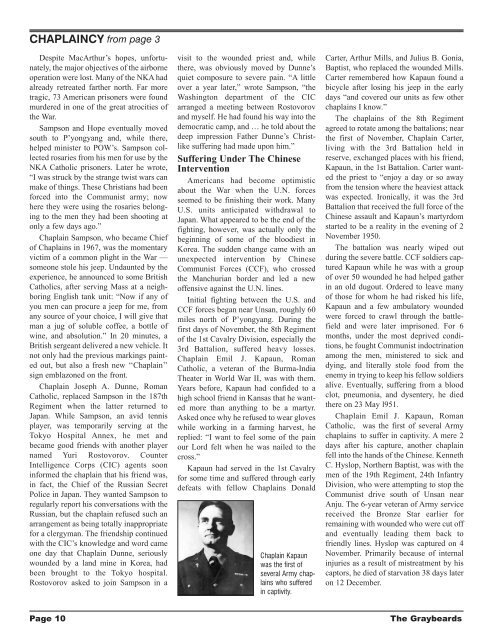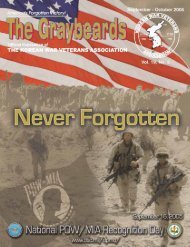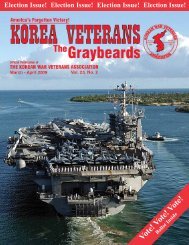The Graybeards - KWVA - Korean War Veterans Association
The Graybeards - KWVA - Korean War Veterans Association
The Graybeards - KWVA - Korean War Veterans Association
You also want an ePaper? Increase the reach of your titles
YUMPU automatically turns print PDFs into web optimized ePapers that Google loves.
CHAPLAINCY from page 3<br />
Despite MacArthur’s hopes, unfortunately,<br />
the major objectives of the airborne<br />
operation were lost. Many of the NKA had<br />
already retreated farther north. Far more<br />
tragic, 73 American prisoners were found<br />
murdered in one of the great atrocities of<br />
the <strong>War</strong>.<br />
Sampson and Hope eventually moved<br />
south to P’yongyang and, while there,<br />
helped minister to POW’s. Sampson collected<br />
rosaries from his men for use by the<br />
NKA Catholic prisoners. Later he wrote,<br />
“I was struck by the strange twist wars can<br />
make of things. <strong>The</strong>se Christians had been<br />
forced into the Communist army; now<br />
here they were using the rosaries belonging<br />
to the men they had been shooting at<br />
only a few days ago.”<br />
Chaplain Sampson, who became Chief<br />
of Chaplains in 1967, was the momentary<br />
victim of a common plight in the <strong>War</strong> —<br />
someone stole his jeep. Undaunted by the<br />
experience, he announced to some British<br />
Catholics, after serving Mass at a neighboring<br />
English tank unit: “Now if any of<br />
you men can procure a jeep for me, from<br />
any source of your choice, I will give that<br />
man a jug of soluble coffee, a bottle of<br />
wine, and absolution.” In 20 minutes, a<br />
British sergeant delivered a new vehicle. It<br />
not only had the previous markings painted<br />
out, but also a fresh new ‘‘Chaplain’’<br />
sign emblazoned on the front.<br />
Chaplain Joseph A. Dunne, Roman<br />
Catholic, replaced Sampson in the 187th<br />
Regiment when the latter returned to<br />
Japan. While Sampson, an avid tennis<br />
player, was temporarily serving at the<br />
Tokyo Hospital Annex, he met and<br />
became good friends with another player<br />
named Yuri Rostovorov. Counter<br />
Intelligence Corps (CIC) agents soon<br />
informed the chaplain that his friend was,<br />
in fact, the Chief of the Russian Secret<br />
Police in Japan. <strong>The</strong>y wanted Sampson to<br />
regularly report his conversations with the<br />
Russian, but the chaplain refused such an<br />
arrangement as being totally inappropriate<br />
for a clergyman. <strong>The</strong> friendship continued<br />
with the CIC’s knowledge and word came<br />
one day that Chaplain Dunne, seriously<br />
wounded by a land mine in Korea, had<br />
been brought to the Tokyo hospital.<br />
Rostovorov asked to join Sampson in a<br />
visit to the wounded priest and, while<br />
there, was obviously moved by Dunne’s<br />
quiet composure to severe pain. “A little<br />
over a year later,” wrote Sampson, “the<br />
Washington department of the CIC<br />
arranged a meeting between Rostovorov<br />
and myself. He had found his way into the<br />
democratic camp, and … he told about the<br />
deep impression Father Dunne’s Christlike<br />
suffering had made upon him.”<br />
Suffering Under <strong>The</strong> Chinese<br />
Intervention<br />
Americans had become optimistic<br />
about the <strong>War</strong> when the U.N. forces<br />
seemed to be finishing their work. Many<br />
U.S. units anticipated withdrawal to<br />
Japan. What appeared to be the end of the<br />
fighting, however, was actually only the<br />
beginning of some of the bloodiest in<br />
Korea. <strong>The</strong> sudden change came with an<br />
unexpected intervention by Chinese<br />
Communist Forces (CCF), who crossed<br />
the Manchurian border and led a new<br />
offensive against the U.N. lines.<br />
Initial fighting between the U.S. and<br />
CCF forces began near Unsan, roughly 60<br />
miles north of P’yongyang. During the<br />
first days of November, the 8th Regiment<br />
of the 1st Cavalry Division, especially the<br />
3rd Battalion, suffered heavy losses.<br />
Chaplain Emil J. Kapaun, Roman<br />
Catholic, a veteran of the Burma-India<br />
<strong>The</strong>ater in World <strong>War</strong> II, was with them.<br />
Years before, Kapaun had confided to a<br />
high school friend in Kansas that he wanted<br />
more than anything to be a martyr.<br />
Asked once why he refused to wear gloves<br />
while working in a farming harvest, he<br />
replied: “I want to feel some of the pain<br />
our Lord felt when he was nailed to the<br />
cross.”<br />
Kapaun had served in the 1st Cavalry<br />
for some time and suffered through early<br />
defeats with fellow Chaplains Donald<br />
Chaplain Kapaun<br />
was the first of<br />
several Army chaplains<br />
who suffered<br />
in captivity.<br />
Carter, Arthur Mills, and Julius B. Gonia,<br />
Baptist, who replaced the wounded Mills.<br />
Carter remembered how Kapaun found a<br />
bicycle after losing his jeep in the early<br />
days “and covered our units as few other<br />
chaplains I know.”<br />
<strong>The</strong> chaplains of the 8th Regiment<br />
agreed to rotate among the battalions; near<br />
the first of November, Chaplain Carter,<br />
living with the 3rd Battalion held in<br />
reserve, exchanged places with his friend,<br />
Kapaun, in the 1st Battalion. Carter wanted<br />
the priest to “enjoy a day or so away<br />
from the tension where the heaviest attack<br />
was expected. Ironically, it was the 3rd<br />
Battalion that received the full force of the<br />
Chinese assault and Kapaun’s martyrdom<br />
started to be a reality in the evening of 2<br />
November 1950.<br />
<strong>The</strong> battalion was nearly wiped out<br />
during the severe battle. CCF soldiers captured<br />
Kapaun while he was with a group<br />
of over 50 wounded he had helped gather<br />
in an old dugout. Ordered to leave many<br />
of those for whom he had risked his life,<br />
Kapaun and a few ambulatory wounded<br />
were forced to crawl through the battlefield<br />
and were later imprisoned. For 6<br />
months, under the most deprived conditions,<br />
he fought Communist indoctrination<br />
among the men, ministered to sick and<br />
dying, and literally stole food from the<br />
enemy in trying to keep his fellow soldiers<br />
alive. Eventually, suffering from a blood<br />
clot, pneumonia, and dysentery, he died<br />
there on 23 May l951.<br />
Chaplain Emil J. Kapaun, Roman<br />
Catholic, was the first of several Army<br />
chaplains to suffer in captivity. A mere 2<br />
days after his capture, another chaplain<br />
fell into the hands of the Chinese. Kenneth<br />
C. Hyslop, Northern Baptist, was with the<br />
men of the 19th Regiment, 24th Infantry<br />
Division, who were attempting to stop the<br />
Communist drive south of Unsan near<br />
Anju. <strong>The</strong> 6-year veteran of Army service<br />
received the Bronze Star earlier for<br />
remaining with wounded who were cut off<br />
and eventually leading them back to<br />
friendly lines. Hyslop was captured on 4<br />
November. Primarily because of internal<br />
injuries as a result of mistreatment by his<br />
captors, he died of starvation 38 days later<br />
on 12 December.<br />
Page 10<br />
<strong>The</strong> <strong>Graybeards</strong>
















